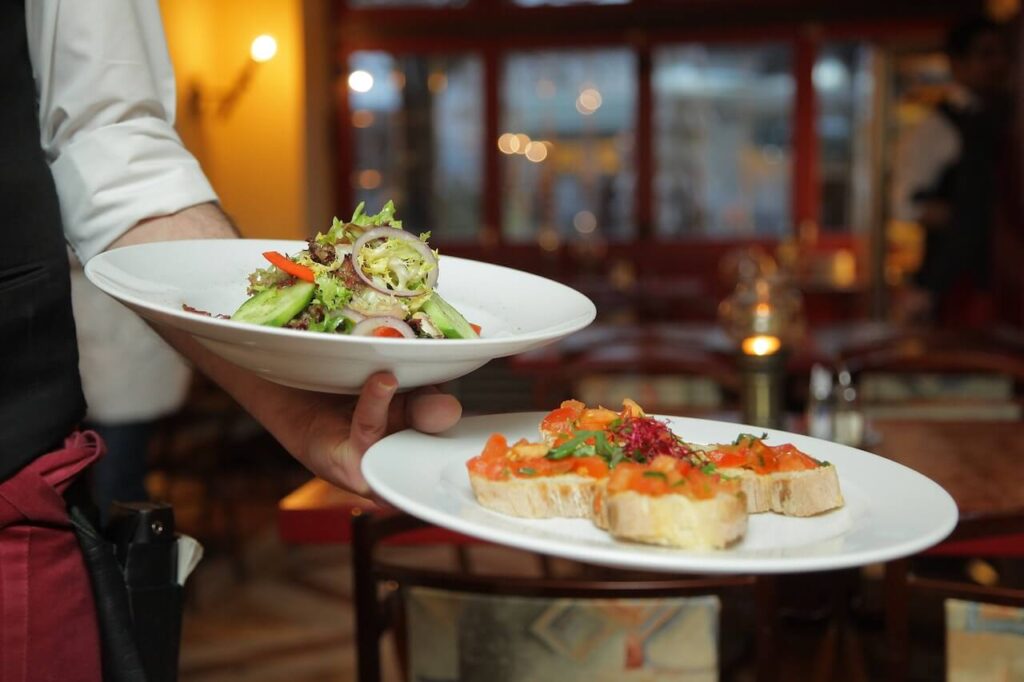As a restaurant manager, managing your business can be a challenging task. There are many things to consider, from maintaining customer satisfaction and controlling restaurant operations to managing your staff, finances, and inventory. However, you can build a thriving business with the right restaurant management tips.
All restaurant managers should be aware that it is essential to continuously evaluate your restaurant’s performance, identify areas for improvement, and make informed decisions to achieve your goals. With dedication, hard work, and effective management, you can build a restaurant business that provides an exceptional dining experience for your guests.
This article will explore the core responsibilities that go into restaurant management and some useful tips that can help you take your restaurant to the next level.
What Are the Best Qualities of a Restaurant Manager?

Before we get into management tips and best practices, let’s first emphasize that managing a restaurant requires a wide range of skills and practices that contribute to a restaurant’s smooth operation and overall success. Here are some of the best qualities of a restaurant manager.
1. Leadership
A good restaurant manager sets the tone for the entire team. They provide strong leadership, inspire their staff, and lead by example. They establish clear goals and expectations and motivate their employees to strive for excellence.
2. Communication
Effective communication is crucial in a restaurant environment. A great restaurant manager ensures that there is open and transparent communication among the team members.
They should be able to clearly convey expectations, provide constructive feedback, and listen actively to the concerns and suggestions of their staff.
3. Organization and Planning
A successful restaurant owner or manager is highly organized and skilled at planning. They anticipate busy periods, create schedules that match staffing needs, and effectively allocate resources to meet customer demands. Proper planning helps streamline day-to-day operations and ensures a smooth flow of activities in the restaurant.
4. Staff Development
A good manager recognizes the importance of investing in their staff’s development. They provide training and coaching to enhance the skills of their employees.
Regular performance evaluations and constructive feedback help individuals grow professionally, improving both their productivity and job satisfaction.
5. Customer Service Skills
Exceptional customer service is a top priority for any restaurant business management. A skilled manager ensures that all employees understand the importance of delivering outstanding service.
They empower their restaurant workers to handle customer inquiries, online reviews, and complaints promptly and effectively, going above and beyond to exceed customer satisfaction and expectations.

6. Financial Management
A competent manager understands the financial aspect of running a restaurant. They monitor and control costs, including food and beverage inventory, labor costs, and other overheads.
They create budgets, analyze financial reports, and make data-driven decisions to maximize profitability while maintaining quality.
7. Adaptability
The restaurant industry is dynamic and ever-changing. A good manager is flexible and adaptable to new trends, customer preferences, and industry developments.
They are quick to adjust operations, update menus, and embrace innovations that can enhance efficiency and competitiveness.
8. Team Building
Building a cohesive and motivated team is essential for success. A good restaurant manager fosters a positive attitude and work environment, encourages teamwork, and recognizes and rewards employee achievements. They promote a culture of respect, cooperation, and camaraderie among staff members.
9. Attention to Detail
A successful manager pays attention to every aspect of the restaurant’s operations. They have a keen eye for detail and ensure that cleanliness, hygiene, food quality, and presentation meet the highest standards. They also manage inventory effectively, minimizing waste and ensuring timely replenishment.
10. Problem-Solving
Challenges and unexpected issues are bound to arise in the restaurant industry. A skilled manager remains calm under pressure and possesses strong problem-solving skills.
They are proactive in addressing issues, finding solutions, and implementing preventive measures to avoid similar problems in the future.
Read more: 10 Common Problems in Restaurant Management
11. Empathy and People Skills
The ability to connect with and understand both staff and customers fosters positive relationships, boosts morale, and creates a welcoming atmosphere.
12. Conflict Resolution
Skilled managers defuse conflicts among staff members or with customers diplomatically, fostering a harmonious work environment.
13. Ethical Integrity
Demonstrating ethical behavior and integrity in all interactions maintains trust and credibility with both staff and customers.
14. Passion for Food and Hospitality
A genuine passion for the culinary arts and providing exceptional hospitality drives a manager’s commitment to excellence.
15. Continuous Learning
A willingness to stay updated with industry developments, attend training, and seek personal growth contributes to ongoing success. Find a mentor as it is no easy task to manage a restaurant alone.
In summary, the best restaurant management skills require strong leadership, effective communication, organization, staff development, exceptional customer service, financial acumen, adaptability, team building, attention to detail, and problem-solving skills.
By embodying these qualities, a professional manager can create a thriving restaurant that delights customers, inspires employees, and achieves long-term success.
12 Useful Restaurant Management Tips

Implementing these 12 successful restaurant management tips can help you build a successful business and stand out in the competitive restaurant industry. However, it’s important to note that each restaurant is unique and may require additional strategies to thrive.
1. Define Your Brand and Target Audience
Before you start your restaurant, defining your brand and target audience is crucial. This will help you clearly envision your establishment’s identity and marketing strategy.
Your brand identity should reflect your restaurant’s personality and values, which will attract your target audience. Make sure you research your target market and understand their preferences, so you can create a menu and ambience that appeals to them.
2. Hire the Right People
Your employees are the backbone of your restaurant, so it’s important to hire the right people. When hiring staff, look for individuals who are passionate about the food and hospitality industry and share your restaurant’s values.
Make sure to train your staff on your restaurant’s policies and procedures, so they can provide consistent service and create a positive experience for your guests.
3. Provide Exceptional Customer Service
Exceptional customer service is essential to the success of any food service industry. Train your staff to be knowledgeable, friendly, and attentive to the needs of your customers.
Encourage them to go above and beyond to provide a memorable dining experience. By providing excellent customer service, you can build customer loyalty and increase the likelihood of repeat business.
4. Create a Memorable Atmosphere
The atmosphere of your restaurant can greatly impact the overall dining experience for your customers. A well-designed space can create a unique and memorable atmosphere that sets your restaurant apart from others.
Pay attention to the décor, lighting, music, and overall vibe of your restaurant, and consider hiring a professional designer to help you create a cohesive and inviting space.
5. Prioritise Food Quality
Food quality is the foundation of any successful restaurant, and it is what makes customers reorder. Make sure your menu features high-quality ingredients and recipes that are consistent and delicious.
Regularly review your menu to ensure it’s up-to-date and offers dishes that appeal to your target audience. Consider sourcing ingredients locally to support the community and provide fresh and unique options for your guests.
6. Ensure Food Safety
Food safety is crucial to the success of any restaurant. Ensure that your staff is properly trained in food handling and storage, as well as follows all local and national health codes.
Regularly audit your restaurant’s food safety practices to identify and address any potential issues. By prioritising food safety, you can help protect your customers and avoid any potential legal or financial repercussions.
7. Utilise Social Media
Social media is a powerful tool for promoting your restaurant and engaging with your customers. It provides a platform to showcase your menu, share news and promotions, and respond to customer feedback.
By creating a strong social media presence, you can also build brand awareness and attract new customers. Consider using targeted ads to reach specific audiences or partnering with influencers to expand your reach.
8. Stay Up-to-Date on Industry Trends
Staying up-to-date on industry trends is essential to running a successful restaurant. Attend industry events and read industry publications to stay informed about the latest trends and innovations.
Also, make sure to regularly review your menu and operations to ensure you’re keeping up with industry standards and meeting customer expectations.

9. Embrace Sustainability
Embracing sustainability practices is becoming increasingly important to consumers, and adopting eco-friendly initiatives can help your restaurant stand out in a crowded market.
For example, you can reduce your environmental impact by using biodegradable or reusable materials for take-out containers, implementing composting or recycling programs, and sourcing locally grown ingredients to reduce your carbon footprint. Not only that but reducing food waste can also help you save money and improve your bottom line.
10. Emphasise Seasonality
Incorporating seasonal ingredients into your menu can help you provide fresh and exciting options for your customers. Highlighting seasonal offerings on your menu can also help you create a sense of urgency and encourage customers to return frequently to try new dishes.
Additionally, sourcing locally grown ingredients can help support local farmers and reduce your carbon footprint.
11. Build a Strong Online Presence
Having a strong online presence is crucial to attracting new customers and promoting your restaurant. Ensure that your website is up-to-date and mobile-friendly, and invest in Search Engine Optimization (SEO) to improve your search engine rankings.
Also, as mentioned before, you must utilise social media by creating profiles on platforms such as Facebook, Instagram, and Twitter, then use them to engage with your customers and share news and promotions.
12. Focus on Employee Training and Development
Investing in your employees is essential to the success of your restaurant. Provide regular training sessions to help your staff improve their skills and knowledge, as well as incentivize them to provide exceptional service.
Consider offering opportunities for professional development and career advancement to help retain your top talent. Additionally, ensuring a positive work environment can help reduce turnover and foster a strong team culture.
Implementing these best restaurant management tips can help you build a successful business and stand out in a crowded market. By prioritising sustainability, customer service, and workforce management, you can help ensure the long-term success of your restaurant.
Looking for an easy and efficient way to manage your restaurant’s workforce? Consider StaffAny’s connected workforce solution! Our platform streamlines employee scheduling, time tracking, and payroll, making it easier for you to focus on growing your business.
With features such as shift reminders and timely notifications, you can ensure that your restaurant runs smoothly and your staff is engaged and happy. Try StaffAny’s connected workforce today and see how we can help take your restaurant to the next level!












